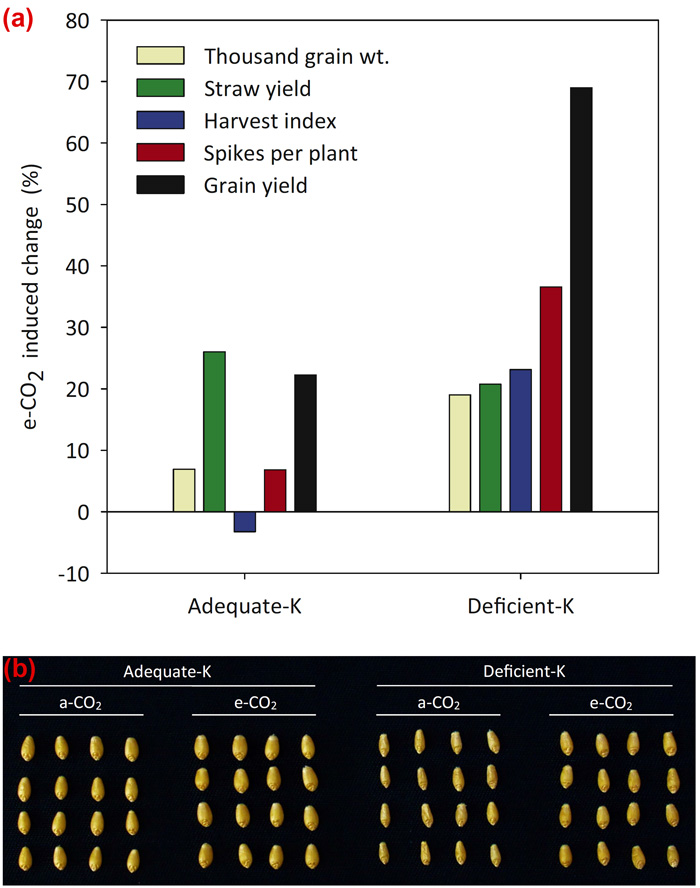| Tweet | Follow @co2science |
Paper Reviewed
Asif, M., Tune, C.E. and Ozturk, L. 2018. Changes in yield attributes and K allocation in wheat as affected by K deficiency and elevated CO2. Plant Soil 426: 153-162.
Plant growth is dependent upon many factors, such as water availability, sunlight, atmospheric CO2 concentration, temperature and nutrient availability. One nutrient that plays an important role in plant physiological processes, including osmoregulation, enzyme activity, electrical neutralization and the control of turgor pressure, is potassium (K). It also impacts photosynthetic activity and assists in the retranslocation of fixed carbon in plant tissues. However, little is known about how rising atmospheric CO2 concentrations impact K-dependent activities and plant processes.
Seeking to provide some information in this regard, Asif et al. (2018) designed a study to examine the impact of elevated CO2 on bread wheat (Triticum asesivum, cv. Tahirova) plants subjected to adequate or deficient K fertilization. Specifically, they grew the wheat for an entire growing season in pots in controlled environment chambers maintained at either ambient (420 ppm) or elevated (700 ppm) atmospheric CO2 concentrations and adequate (250 mg K kg-1) or deficient (50 mg K kg-1) K fertilization. At full maturity (90 days after sowing), the researchers harvested the plants and conducted multiple measurements on plant yield and yield components, as well as potassium concentration, content and distribution.
And what did their measurements reveal?
As expected, elevated CO2 positively impacted plant yield parameters, whereas K-deficiency negatively impacted them. Elevated CO2, for example, significantly increase grain yield by 22 and 69 percent in adequate and deficient potassium plants, respectively (see figure below). Plant thousand-grain weight, straw yield and spikes per plant were also higher under elevated CO2 regardless of K treatment level. And although the absolute values of these parameters were reduced in the K-deficient treatment, the relative percent increase or stimulation due to atmospheric CO2 enrichment was higher under K-deficit conditions than K-adequate conditions, indicating elevated CO2 was able to partially ameliorate the negative growth impacts of K deficiency. Asif et al. also found that elevated CO2 enhanced the allocation of potassium into plant grains, particularly so in the K-deficient treatment.
The above findings represent good news for the terrestrial biosphere. Regardless of whether or not potassium is adequate or deficient in the soil, rising atmospheric CO2 will boost future plant growth. And if K is a limiting factor, the simple application of a K-based fertilizer will raise growth and yields even more.

Figure 1. Panel A: Changes in bread wheat (Triticum aestivum, cv. Tahirova) yield attributes in response to elevated atmospheric CO2 (e-CO2: 700 ppm, relative to ambient, 420 ppm) under adequate-K (250 mg K kg-1) and deficient-K (50 mg K kg-1) treatments. Panel B: Image showing sample wheat grains grown under ambient or elevated atmospheric CO2 under adequate or deficient potassium treatments. Source: Asif et al. (2018).




